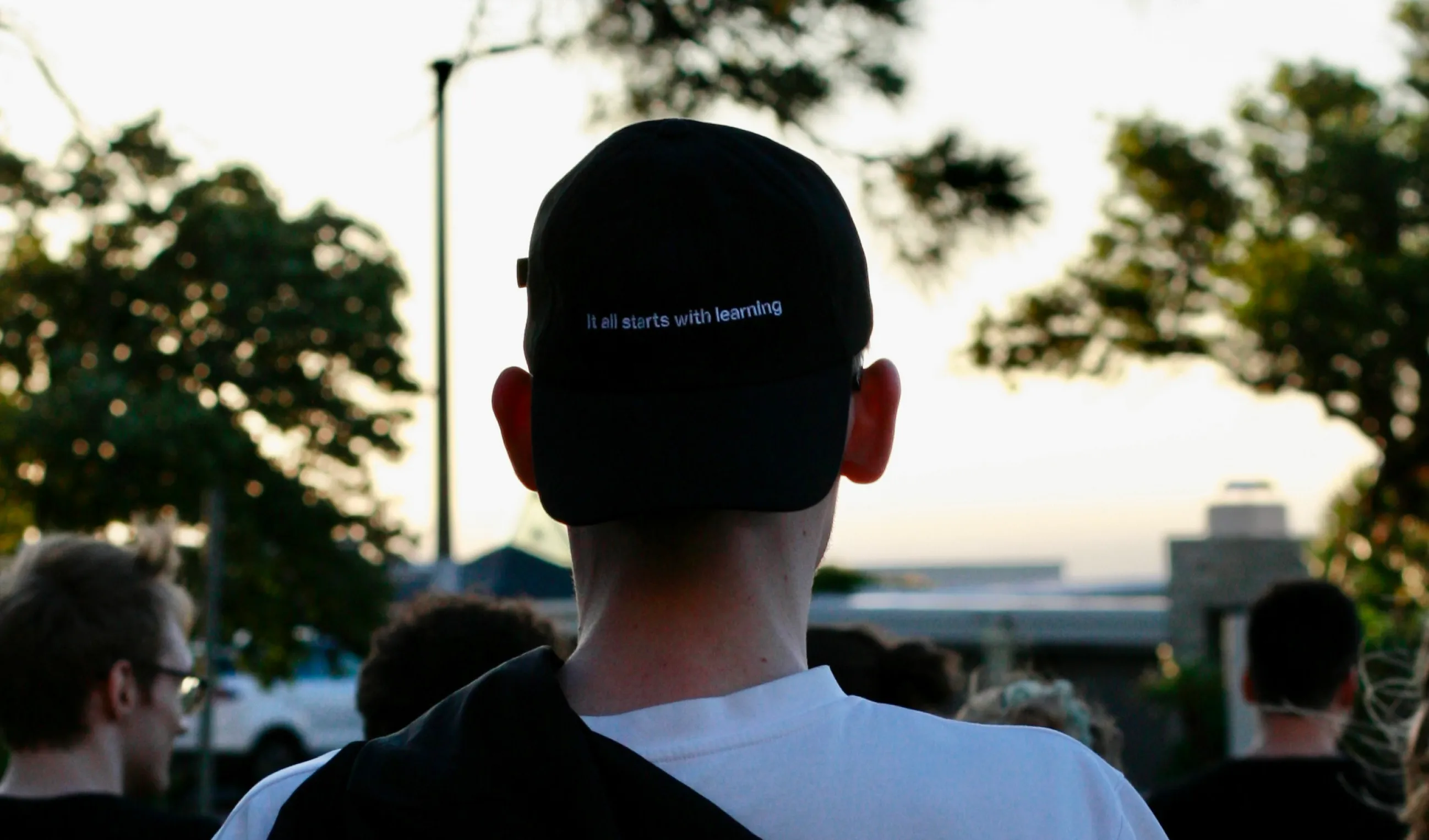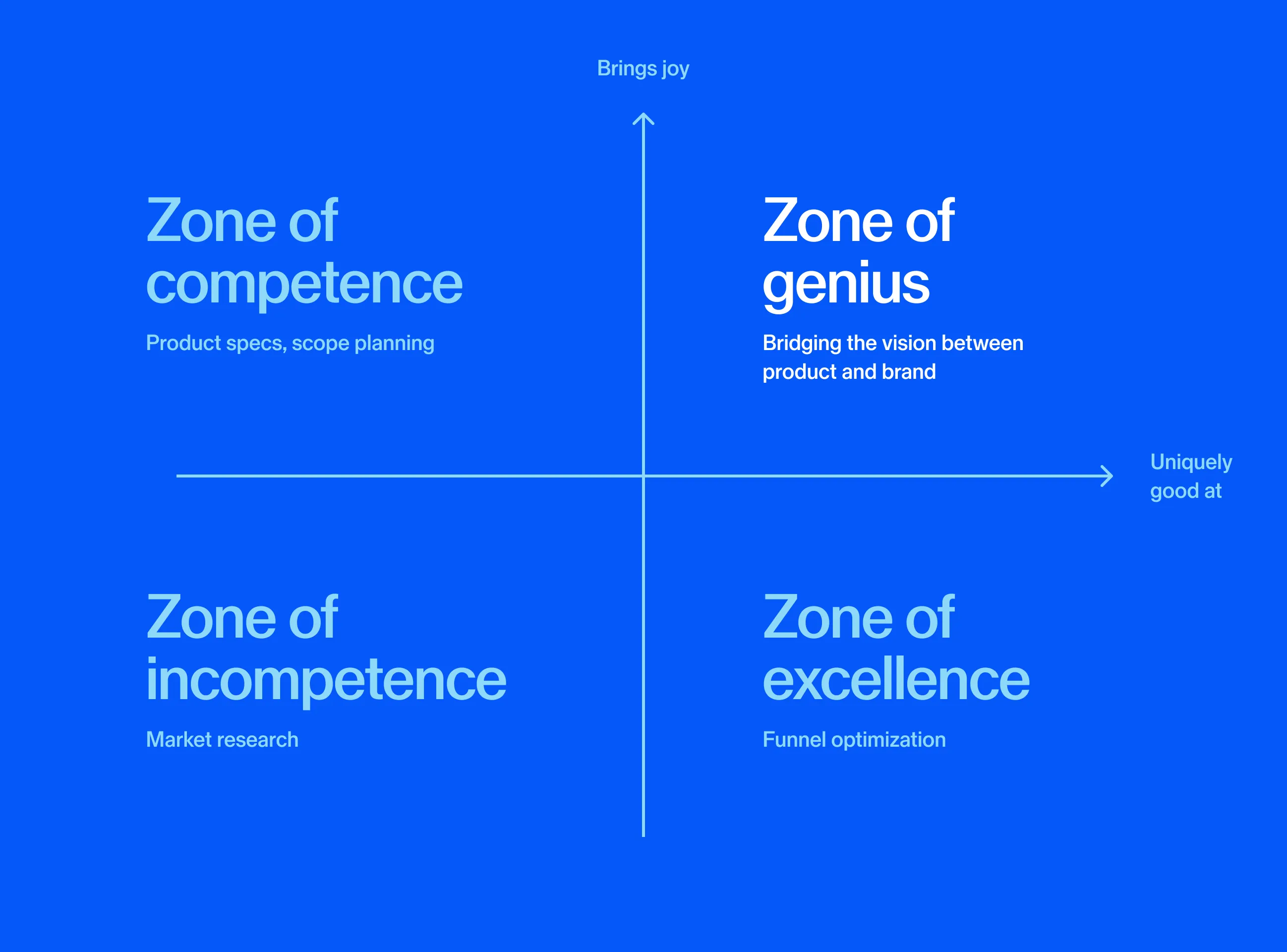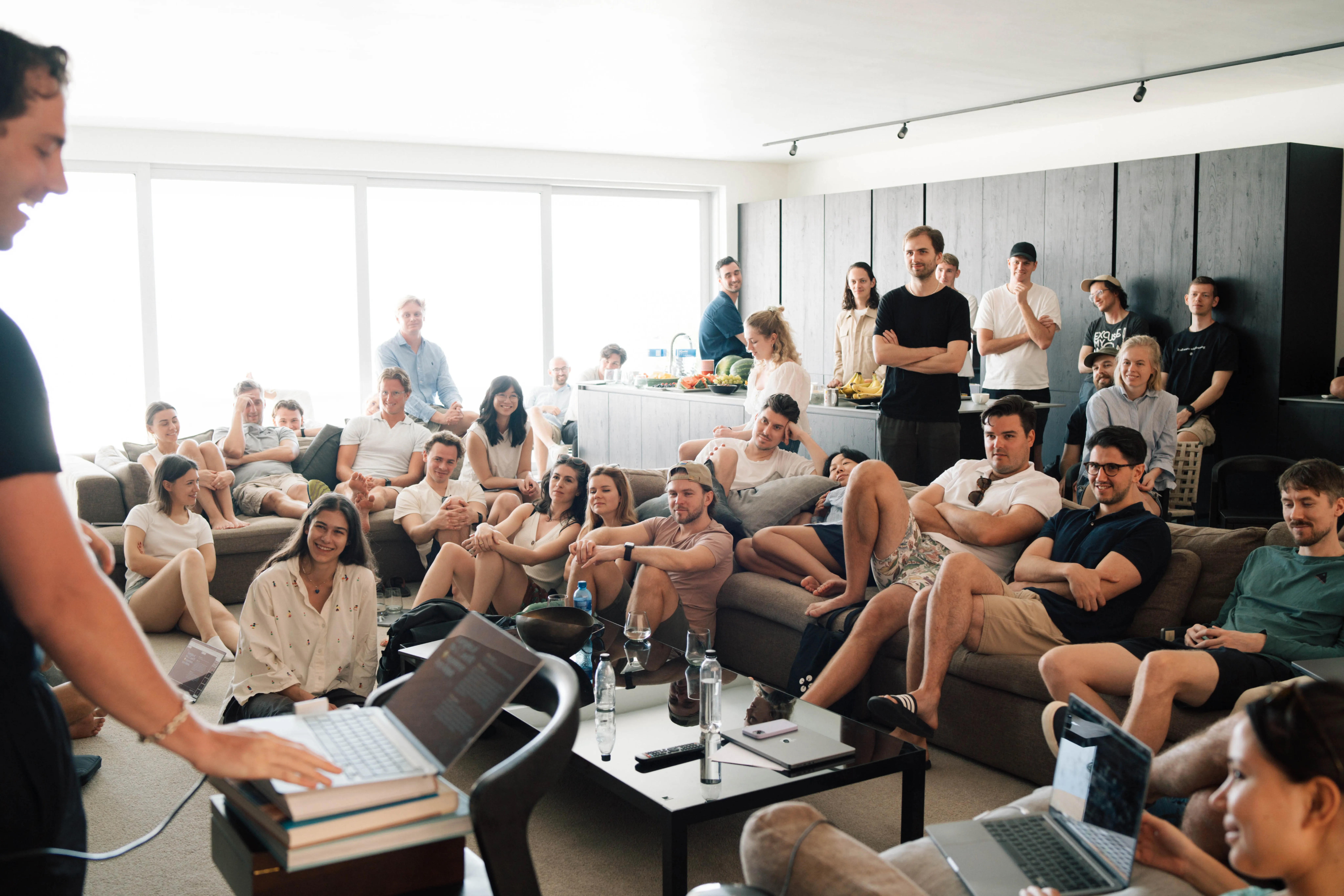Zone of genius
Finding flow for every employee

‘Bringing your whole self to work.’ Is it really helpful? It can be less useful than it sounds. It doesn’t help people to know and understand: ‘what truly makes me tick?’
There’s a low-cost, quick win that managers can leverage. It can help everyone to be their most successful–and their most satisfied. This, in turn, allows everyone to be more productive. The concept is Zone of Genius, and here’s how we use it.
A matrix for brilliance
At Sana, we want people to do their life’s work. That means we’re responsible for nurturing the talent and ambition of every employee who walks through our doors. Every single day.
This is why we love Zone of Genius.
At its most simple, Zone of Genius is a matrix that helps people to learn where they’re distinctly talented. We borrow the idea from psychologist Gay Hendricks, and love how Front CEO Matilde Collin has adapted it. To me, it’s the ultimate matrix for learning unique brilliance.

The definitions are:
- Zone of Incompetence: Activities that other people probably do better than you (e.g. writing training manuals). These activities also reduce your energy.
- Zone of Competence: Activities that you do just fine, but others are as good as you at them (e.g. cleaning data-sets). But! These activities also bring you joy (because who doesn’t love a tidy spreadsheet?).
- Zone of Excellence: Activities that you are excellent at—better than most, in fact—but don’t love doing. When you’re honest with yourself, these activities drain your energy
- Zone of Genius: Activities that you are uniquely good at in the world, and that you love to do, so much so, that time and space likely disappear when you do them. These activities charge up your metaphorical batteries!
Every single activity that you do in life—personal and professional—falls into one of these four zones.
Being good at something doesn’t mean we enjoy it. We are constantly working on tasks that don't give us energy. What we might miss, however, is that the people around us are just as talented at the same activities. The key difference is that they also recharge their energy from these same activities.
Without a framework like Zone of Genius to make these preferences transparent, organizations can run oblivious to how their employees truly feel about the work they’re doing. That’s a dangerous game to play at the best of times, let alone in situations of macroeconomic uncertainty.
Building energy, maximizing productivity
Zone of Genius is beneficial for the business and the employee because it recognizes an important truth: time spent on a task and productivity do not correlate. The four zones listed emphasize energy rather than time. The more time you spend doing what you love, the more energy you have; the more energy you have, the more productive and happier you’ll be. It’s that simple.
At Sana, we believe it’s our responsibility to help our employees manage their energy effectively. So we’ve made Zone of Genius a ritual exercise for every new hire and their manager. It’s part of building a bond–and sets the stage for quarterly Zone of Genius check-ins. It’s a personal exercise, but we nurture it at work because it builds psychological safety and helps people to understand themselves better.
I help all Sanians with their Zone of Genius, and the results always surprise me. So often, we devalue our strengths and skills. What’s familiar to a person can feel unremarkable; what provides energy can seem mundane. But when people are able to understand their strengths and energy with clarity, they’re empowered. They have the gift of knowledge.
Discover your Zone of Genius
Understanding Zone of Genius isn’t just a managerial skill—everyone should have that self-knowledge. But before introducing the concept to your employees, I’d suggest getting to know it for your own needs. It will help you to guide them through the process.
If you’re doing this activity for the first time, it’s helpful to have someone who can bounce ideas with you and provide an outside eye on your skills. Grab a trusted colleague, your calendar, and the matrix. It’s time to find your Zone of Genius.
First, grab your calendar
Step 1: open up your calendar. Look over every activity for the last 1-3 weeks. And yes, I mean everything! Every All Hands call, admin task, team social. Even your hobbies outside work.
List every activity in one of the four zones. Does writing a business case give you energy, but you know you’re not a specialist? That’s for the Zone of Competence. Are you amazing at recruitment, but, when you think about it, you realize it leaves you drained? That activity belongs in the Zone of Excellence.
At Sana, we encourage people to add their social activities, though that’s a personal choice. For example, I read biographies and bring those learnings to the team. Maybe an engineer is building a game, or a marketer is writing a newsletter. Sanians find it informative to think about their time and activities as a whole. This helps us to find interesting patterns and gaps–the places where genius might be hiding.
As you note activities, think about how you felt at the time: were you weary after thinking about vacation policies? Did designing that away day fill you with joy? Note it down. Listen to yourself closely.
Next, take a step back
If you haven’t already, try to locate 3 to 5 skills that sit within your Zone of Genius–you might be lucky and have loads already noted, but be specific and hone it down. If you don’t have 3 to 5, dig a little deeper, or ask your trusted colleague for their thoughts.
Then, with this exciting insight in hand, ask yourself: “How can I spend even more time working in this area?” If more of your personal activities than your work skills sit within your Zone of Genius, can you bring this information to your manager to help them leverage your skills to grow your career?
Get ready to grow - and excel
While finding genius is the goal, don’t overlook the other zones. They teach you what to do with the other non-genius activities on your table.
Zone of Competence
Competence activities are a huge learning opportunity. After all, they give you energy. With a little more focus and expertise, competence could evolve into genius. Take your learnings and talk with your manager–how can your responsibilities evolve with this information in mind? Can you ask for more training? You’ll never know until you try.
Zone of Excellence
These are the activities you should be outsourcing or automating. They don’t give you energy, so they won’t serve you in the long run. If or when you can’t let these tasks go, build in some gamification. Challenge yourself to timeboxing the tasks in half the time, treat yourself to an oat latte when you’re done — however it works for you, make it awesome.
Rolling out Zone of Genius
Now you’ve located your Zone of Genius, it’s time to help everyone else in your team. At Sana, we run the exercise every 3 months. It’s a long enough time to make meaningful progress, without allowing for drift.
If Zone of Genius is new to your ways of working, it’s low-cost to roll out. But it’s high leverage–the insights it uncovers are profoundly useful for individuals and their employers. When people and their employers understand ‘motivation+energy’, it allows everyone to work with passion and impact.
Here's some ideas to help you introduce and embed Zone of Genius across your company.
Launch your plan
People can find their Zone of Genius by working alone or in pairs. You could host a kick-off workshop to introduce the activity, then split the group into pairs. No management consultants or costly workbooks. All we’re using is people, calendars, and the matrix. After the exercise, bring everyone back together to share their experiences and learnings. The more open the discussion, the easier the process becomes.
Sustain with review cycles
A Zone of Genius exercise is a valuable addition to the quarterly performance review. Sure, it adds a little extra time to review sessions. But it’s worth it. You’ll have the latest peer and manager feedback in hand, and 3 month’s worth of performance data—that’s ideal for assessing whether the person’s zones have shifted.
Create a common language
When everyone understands Zone of Genius, it becomes a tool to clarify responsibility.
For example, at Sana, it's common to hear someone say, 'I can help, but this isn't my Zone of Genius. Let's find a better way to move this task forward.' It’s much more constructive and informative than saying you don’t want to do something, or worse, taking on the task and resenting it. With the Zone of Genius in your company’s vocabulary, everyone can be more transparent.
Finding someone’s Zone of Genius is a special moment. You’ve found that match between talent and energy, and can see an exciting future in their eyes. If, like me, those are the moments you live for, you’re in for an incredible and rewarding journey.
How rituals fuel growth
Read article
